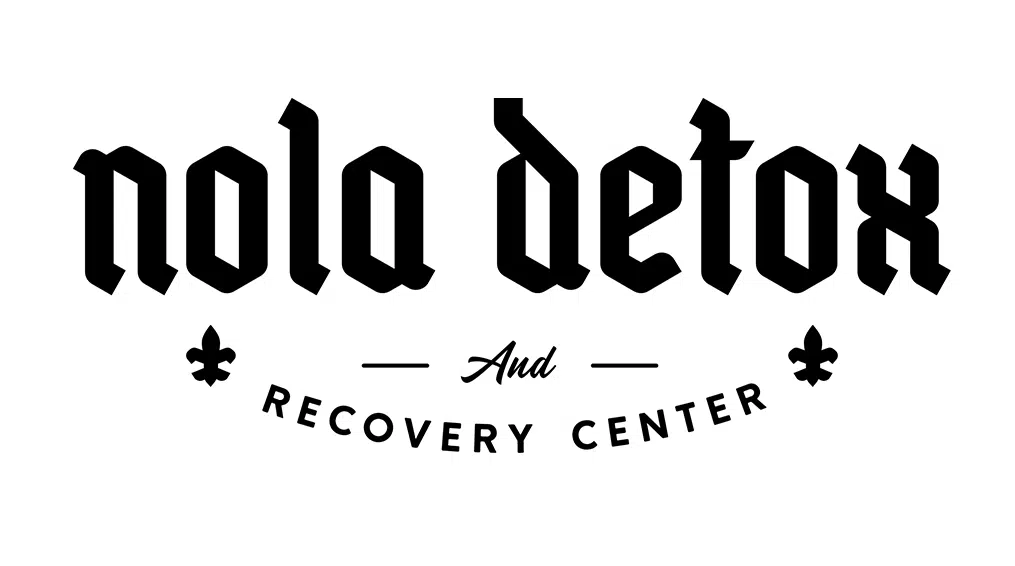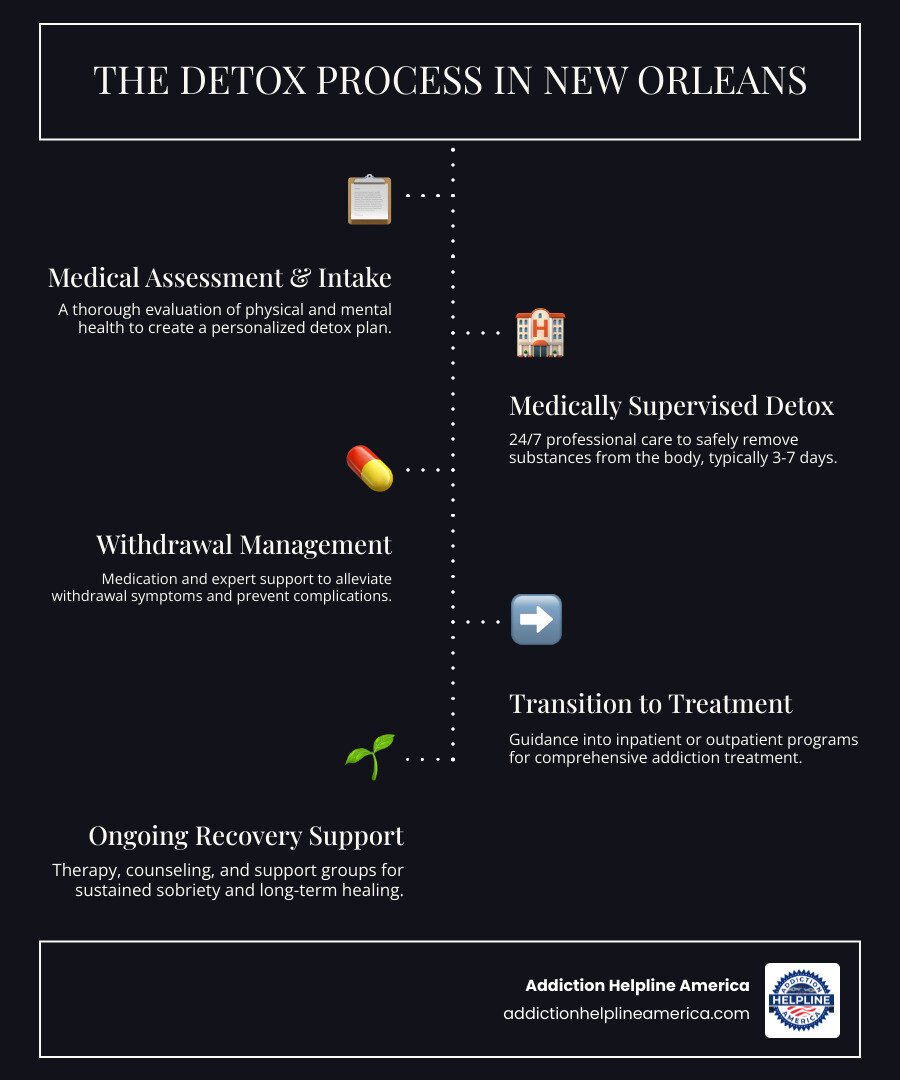
Finding Hope: Your Guide to Detox Services in New Orleans
Detox in new orleans is the critical first step toward recovery from substance use disorder. Here’s what you need to know right now:
Quick Facts About Detox in New Orleans:
- Medical Detox Available: 24/7 supervised withdrawal management at multiple facilities
- Cost Range: $5,000-$50,000 for inpatient; $1,000-$10,000 for outpatient
- Free Options: 15 state-funded programs offer no-cost treatment if you have no income
- Duration: Typically 3-7 days, depending on substance and individual factors
- Insurance Accepted: Most facilities accept major insurance plans, Medicaid, and TRICARE
- Locations: 7 dedicated detox centers in New Orleans, plus 21 outpatient facilities
If you or someone you love is struggling with addiction in New Orleans, you’re not alone. The path to recovery starts with safely removing harmful substances from your body under medical supervision. This process—called detoxification or detox—manages withdrawal symptoms and prepares you for the next steps in treatment.
Detox is not the same as full addiction treatment. It addresses physical dependence but doesn’t tackle the underlying causes of substance use. That’s why most people need continued care after detox, including therapy, counseling, and support groups.
New Orleans offers a range of detox options. Some facilities provide medically supported detox with dozens of beds for people who can’t afford private treatment. Others offer specialized programs for veterans, LGBTQ individuals, and people with co-occurring mental health conditions. Many centers emphasize New Orleans hospitality alongside evidence-based care.
The good news? Help is available regardless of your financial situation. State-funded programs provide free treatment if you have no income, and many facilities offer sliding-scale fees, payment plans, and accept most insurance.
At Addiction Helpline America, we’ve helped countless individuals and families in New Orleans find the path from detox through long-term recovery. Our 24/7 helpline provides immediate support to guide you toward the right detox program for your unique situation.
Detox in new orleans further reading:
- alcohol rehab centers in new orleans
- rehab facilities in new orleans
- Addiction counseling New Orleans
Understanding the Detox Process
If you’re considering detox in New Orleans, understanding the process can help you see why professional support is so important.
It’s useful to know the difference between physical dependence and addiction. Physical dependence occurs when your body adapts to a substance and creates withdrawal symptoms when you stop. Addiction is a complex brain disease that involves compulsive substance use despite harmful consequences. Detox addresses the physical dependence, but it doesn’t treat addiction. It’s the vital first step that makes long-term healing possible through therapy and ongoing support.
Attempting to detox alone can be dangerous. Withdrawal from certain substances—especially alcohol and benzodiazepines—can cause life-threatening complications. Professional medical supervision ensures your safety and comfort during a process that can be unpredictable and severe.
What is Medically Supported Detox?
Medically supported detox means you are monitored by medical professionals around the clock. This 24/7 medical supervision is crucial for your safety.
In a detox in New Orleans facility, nurses and doctors check your vital signs, watch for complications, and adjust your care as needed. A key part of this is medication-assisted withdrawal management. For opioid dependence, medications like Buprenorphine and Naltrexone can reduce cravings and symptoms. For alcohol and benzodiazepine dependence, doctors often use carefully controlled tapering programs to gradually reduce the substance, lowering the risk of seizures or a fatal condition called delirium tremens.
These medications also help with common withdrawal symptoms like nausea, anxiety, and insomnia. The goal is to make the process safe and bearable so you can focus on the next step: recovery.
If you need immediate help or want referrals to treatment options, Addiction Helpline America offers free, confidential support 24/7. Start here: alcohol and drug addiction treatment in New Orleans, Louisiana.
What to Expect During Withdrawal
Withdrawal is different for everyone, depending on the substance used, duration of use, and your personal health.
Physical symptoms can include nausea, vomiting, muscle aches, tremors, and sweating. For alcohol and benzodiazepine withdrawal, seizures are a dangerous possibility, which is why medical supervision is critical.
Psychological symptoms are just as challenging and can include anxiety, depression, irritability, and intense cravings. Hallucinations and sleep disturbances are also possible.
The timeline varies. Alcohol withdrawal can begin within hours, peak at 24 to 72 hours, and may include severe complications like seizures and delirium tremens (a dangerous state of confusion and fever). Opioid withdrawal, while rarely life-threatening, is extremely uncomfortable, with symptoms appearing within 6 to 12 hours for short-acting opioids and lasting for several days.
Most detox processes last 3 to 7 days, but some cases require more time. A safe, medically supervised environment is paramount to manage your symptoms and ensure your safety throughout this phase. You don’t have to go through it alone.
Navigating Treatment Options for Detox in New Orleans
Completing detox is just the beginning of your recovery. New Orleans offers a spectrum of treatment options known as the continuum of care, which provides a progression of support that adapts to your changing needs.
Finding the right fit is essential. A successful program considers your unique circumstances, including your substance use history, home environment, and any co-occurring mental health conditions.
Inpatient and Outpatient Rehab Programs
After detox in new orleans, the main choice is between inpatient and outpatient treatment. Both are effective, but they suit different needs.
Inpatient (or residential) rehab involves living at a treatment facility for 28 to 90 days. It offers a structured, substance-free environment with 24/7 support. This intensive approach is ideal if you have a severe addiction, an unstable home life, or co-occurring mental health disorders.
Outpatient rehab allows you to live at home while attending scheduled treatment sessions. This flexibility lets you continue with work, school, or family duties. It’s a good option if you have a strong support system and a mild to moderate addiction.
Here’s how they compare:
| Feature | Inpatient (Residential) Rehab | Outpatient Rehab |
|---|---|---|
| Environment | 24/7 supervised facility with structured, substance-free living | Live at home, attend scheduled therapy at a treatment center |
| Intensity | High—comprehensive daily schedule of therapy and activities | Moderate to low—flexible schedule around work and family |
| Duration | Typically 28-90 days | Varies widely; IOPs often run 3-6 months |
| Cost | Higher ($5,000-$50,000 in New Orleans) | Lower ($1,000-$10,000 in New Orleans) |
| Ideal Candidate | Severe addiction, unstable home, co-occurring disorders, need for constant support | Strong support system, stable home, work/school commitments |
| Support Level | Constant medical and therapeutic support | Scheduled therapeutic support with personal accountability |
Other options exist, such as Partial Hospitalization Programs (PHP), which offer daytime treatment, and Intensive Outpatient Programs (IOP), which provide structured therapy several times a week. These programs balance intensive support with real-world responsibilities.
For more details about connecting to the right level of care, visit our page on alcohol and drug addiction treatment in New Orleans, Louisiana.
Services Offered by Addiction Helpline America in New Orleans
Choosing a treatment program can be overwhelming. Addiction Helpline America is here to guide you.
Our helpline connects you to a network of New Orleans facilities. We assess your situation to help you find a program that truly fits.
- Medically Supported Detox: We connect you to centers with 24/7 medical supervision for a safe withdrawal.
- Intensive Inpatient and Outpatient Programs: We help you find the right match, whether you need a 28-day residential program or a flexible outpatient schedule.
- Dual Diagnosis Treatment: We connect you to facilities that treat co-occurring mental health conditions like depression or anxiety alongside substance use.
- Specialized Programs: We can help you find programs designed for veterans, LGBTQ+ individuals, seniors, and others with unique needs.
- Support for Families: We connect you with programs that include family therapy and education to help loved ones participate in recovery.
- Aftercare Planning: We help you find ongoing support like relapse prevention, counseling, and support groups to ensure long-term success.
Our goal is to provide personalized, confidential guidance to evidence-based care. Recovery is possible, and you don’t have to figure it out alone.
The Cost of Rehab and Finding Affordable Detox in New Orleans
Financial concerns are a common barrier to seeking treatment for detox in new orleans. However, your financial situation should not prevent you from getting the help you need. Think of treatment as an investment in your health and future.
There are multiple ways to pay for care, and we’re here to help you find a path that works for you.
Average Costs and Influencing Factors
Treatment costs in New Orleans vary widely. Outpatient programs typically range from $1,000 to $10,000, while inpatient rehab can cost anywhere from $5,000 to $50,000 or more.
Several factors influence these costs. The program type is a major factor, as 24/7 inpatient care is more expensive than outpatient treatment. The duration of the program and the level of amenities like private rooms also affect the price. Finally, the level of care required, such as intensive medical supervision or dual diagnosis treatment, will impact the overall cost.
Expensive doesn’t always mean better. The most important thing is finding an evidence-based program that meets your specific needs.
For more detailed information on treatment costs and their effectiveness, you can review data from this NIH-published paper.
Affordable and Accessible Options
New Orleans has numerous options for people at every income level. Fifteen state-funded programs in the area offer completely free treatment if you have no income. Many facilities also use a sliding-scale fee model, where you pay based on what you can afford.
State-funded programs provide quality care. For example, some operate medically supported detox facilities specifically for people who can’t afford private detox but don’t need hospital-level care. This fills a critical gap in the community.
To access these programs, you’ll typically need to provide identification and proof of income (or lack thereof). The Louisiana Department of Health can connect you with local options and help you steer the system.
Several types of financial assistance can also help:
- Sliding-scale fees adjust costs based on your income.
- Grants from government or non-profit organizations provide funding that doesn’t need to be repaid.
- Scholarships may be available to cover partial or full treatment costs.
- Payment plans allow you to spread costs over time.
Most facilities in New Orleans accept insurance, including private plans, Medicaid, and TRICARE. We can help you understand your coverage and find an in-network facility.
At Addiction Helpline America, we’re here to help you sort through these options. Our confidential helpline is available 24/7 to help you find a program that fits your clinical needs and your budget.
Local Resources and Overcoming Barriers to Treatment
Recovery isn’t a journey you have to take alone. In New Orleans, a strong network of resources exists to help you overcome common challenges like stigma, lack of information, or practical concerns.
We understand that asking for help can feel overwhelming. Building a solid support system is key to addressing these barriers and connecting with compassionate care.
Immediate Help for Individuals in Crisis
If you or someone you love is in crisis, immediate support is available. National and local hotlines offer free, confidential referrals to treatment options around the clock. These services are a safe place to start when you’re not sure where to turn.
Some hospitals in New Orleans offer emergency walk-in psychiatric services, providing immediate access to professional help during a crisis. Additionally, community-based services exist to help coordinate care for mental illness and addictive disorders, connecting you with ongoing support.
Support Groups and Continued Care
Detox in New Orleans is just the beginning. Long-term sobriety thrives on continued support and connection with others who understand your journey.
Well-known 12-step programs like Alcoholics Anonymous (AA) and Narcotics Anonymous (NA) offer a judgment-free space to share experiences and find encouragement through local meetings. For those seeking a different approach, non-12-step programs use cognitive therapy techniques to help change behaviors and build a life beyond addiction.
Your living environment is also crucial in early recovery. Sober living houses provide structured, supportive conditions to help you transition back into daily life while maintaining sobriety. These homes offer affordable and safe housing options for those seeking a recovery-focused environment.
At Addiction Helpline America, we’re here to help you connect with these resources and find the ongoing support that fits your needs. Recovery is possible, and you don’t have to figure it all out on your own. For more comprehensive information about treatment options and local resources, visit our guide on Alcohol Rehab Centers in New Orleans.
Frequently Asked Questions about Detox
When you’re considering detox in New Orleans, it’s natural to have questions. Here are clear, honest answers to some common concerns.
How long does the detox process typically take?
Most people complete detox in 3 to 7 days. However, the timeline is unique to each individual.
Factors that influence the duration include the substance used, the severity of dependence, and your overall health. Alcohol withdrawal often peaks within the first few days, while opioid withdrawal follows a different pattern. Benzodiazepines may require a longer, gradual tapering process. A longer history of heavy use typically means a longer detox period.
The medical team supervising your detox will monitor your progress and adjust the timeline based on your response to treatment.
What should I bring with me to a detox center?
Packing for detox should focus on comfort and essentials.
- Comfortable clothing: Bring soft, loose-fitting clothes and sleepwear for several days.
- Personal toiletries: Pack a toothbrush, toothpaste, shampoo, and deodorant. Ensure they are alcohol-free and non-aerosol.
- Identification and insurance: You will need a driver’s license or other ID and your insurance card.
- Prescribed medications: Bring them in their original containers with clear dosage instructions.
- Emergency contacts list: A list of phone numbers for family or friends is helpful.
- A journal or book: Check with the facility first, but these can be useful for quiet time.
Leave valuables at home, including jewelry, expensive electronics, and large amounts of cash. Most facilities prohibit items like unpermitted medications or alcohol-based products for safety. It’s always a good idea to call the center ahead of time to confirm their specific packing list.
Can I detox from alcohol or benzodiazepines at home?
We must be direct: attempting to detox from alcohol or benzodiazepines at home is extremely dangerous and can be fatal. While the privacy of home is appealing, the risks are too high.
Withdrawal from these substances can cause life-threatening complications like grand mal seizures, which can occur without warning. Another severe risk is Delirium Tremens (DTs), a complication of alcohol withdrawal that causes extreme confusion, rapid heart rate, and high blood pressure. Without medical treatment, DTs can be fatal.
In a medically supervised detox in New Orleans, healthcare professionals monitor you 24/7. They can administer medications to prevent seizures and manage other symptoms, keeping you safe and stable. This professional environment provides the best possible start to recovery by ensuring you complete this critical first step safely.
Your life is worth protecting. Please reach out for professional help before trying to detox on your own. Our 24/7 helpline at Addiction Helpline America can connect you with safe, professional detox facilities.
Your Path to Recovery Starts Today
Simply learning about recovery options is a courageous first step. The journey ahead may seem daunting, but recovery is possible and is happening every day for people in New Orleans.
Let’s recap the key steps. Detox in New Orleans is the medically supervised first phase that prepares you for the real work of recovery: therapy, counseling, and addressing the root causes of substance use. You’ve learned about different levels of care, from inpatient to outpatient, and that cost doesn’t have to be a barrier thanks to state-funded programs and other financial options.
The path forward involves seeking medically supervised detox, finding a treatment program that fits your needs, and building a long-term support system. You do not have to take any of these steps alone.
At Addiction Helpline America, we serve as your confidential guide. We are not a treatment center; we are your connection to a network of quality facilities. Our team provides personalized guidance 24/7, helping you find the right program based on your needs, insurance, and circumstances. There is no pressure and no judgment.
Taking the first step is often the hardest, but it can transform your life. You don’t have to have it all figured out. You just have to start.
If you’re ready to explore your options, we’re here. Let us help you find personalized addiction treatment in New Orleans that gives you the best chance at lasting recovery.
Your healthier, substance-free life is waiting. Today can be the day everything changes.
Our helpline is 100%
free & confidential
If you or someone you care about is struggling with drug or alcohol addiction, we can help you explore your recovery options. Don’t face this challenge alone—seek support from us.
Programs
Resources
Will my insurance
cover addiction
treatment?
We're ready to help
Find the best
drug or alcohol treatment
center
Are you or a loved one struggling with addiction? Call today to speak to a treatment expert.

















